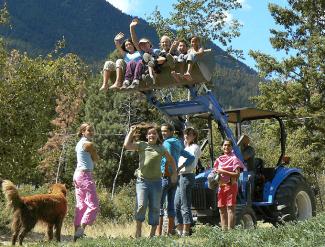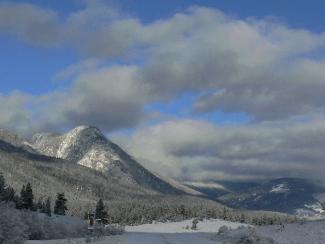There are 1,000 acres of privately owned lands in Saranagati Valley whose forests need attention.
In 1993, we heard about a BC government program that let individuals apply for a license to manage and log Crown forests. The program was designed, in part, to manage the forest fire problem. We applied, and got a woodlot license for 600 hectares (1500 acres) of forest. There are about 800 of these licenses in the Province today. It took eight years from the time we applied until the Ministry of Forests granted license, which is ours in perpetuity. We became the only Certified Organic farm in BC with a woodlot. The woodlot license is owned by Banabehari Forset Enterprises
We see four revenue centers that could come from this woodlot:
- Retreats and schools
- Cottage industries
- Raw and value-add products
- Career opportunities in forestry
Retreats and schools: These can be done in conjunction with the Retreat Center, the Private School, the Youth Camps, and the Cow Protection program. People will come to learn many forest-related things: forestry, working oxen, wildcrafting, etc. Revenue will be generated via tuitions and revenue-sharing with other programs.
Cottage industries: There are numerous small businesses that devotees could start, taking advantage of the woodlot. For example: Agri-forestry: wildcrafting of pinecones, mosses, sage, dyestuffs, oils, medicinal herbs, Christmas wreaths and decorator greenery and cuttings for the year-round floral market. (Misha is a devotee at Saranagati who is already wildcrafting). Fence posts and rails harvested during regular thinning and spacing maintenance
Organically Certified wood treatment facility: No one in North America is product organically treated wood, like fence posts treated against rot. Certified Organic farms are required to use these products, and all the farmers struggle to come up with their own solutions.
What it would take to get the Forestry Program started is to subsidize the education of a Forestry Manager. Once this person is educated, they'll need a paycheck. If we could find someone who already has the education, they could go right to work. This person could also make money as a consultant through the Valley, because these skills are in high demand. We currently have to pay a ticketed forestry guy to come and do certain required activities.The Forestry man would cross-train with the Cow Protection program, and learn how to employ working oxen in logging, etc.
The value of the Forestry Program to the overall project is that once it's running, it enables self-sufficiency in the Valley. Devotees will have their own mills and facilities, lets the community heat and build at low costs. Vitalizes the local economy.


